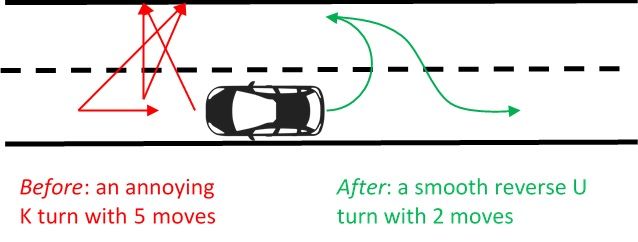Creativity
Better Living Through Noticing
Minor annoyances are prompts to change our perspective and practice creativity.
Posted June 27, 2018
We have all heard of “Aha!” but have you ever experienced “Duh!”? “Duh!” is the experience of missing a simple solution to an annoying problem, and feeling like a dummy when you find it. Case in point: When I was in grad school, every time I came back from campus my car would be parked facing east. Campus was west, so to get back to school meant turning around. My street was narrow, so turning around meant an annoying multi-point K-turn. One day I realized – Duh! – that if instead of going forward I went in reverse, I could turn around much more easily (see Figure 1).

A “Duh” moment is not as enjoyable as an “Aha” because we can feel foolish for having missed an obvious solution. But both represent insight. It means that looking for such simple but overlooked solutions to life’s minor annoyances is a great way to practice a fundamental skill in the craft of creativity – noticing relevant background details that cause perspective change. Using minor annoyances as the prompt to look for insights will both increase the occasions to practice noticing and improve the odds that what you notice will be helpful, because…
You are always missing something
In the last blog, I talked about how our default perspectives lead us to automatically interpret what we perceive one way or another, and how the interpretation that you have can make others seem inconceivable (e.g., you either heard “Yanni” or “Laurel”, and it was hard to imagine hearing the other name). Perspectives also filter what you notice, and thus limit the actions you consider when you have a problem. A classic demonstration of this asked people to attach a candle to a wall, and gave them a box of tacks to do so. [1] People typically assume that they must figure out a way to pin the candle to the wall. Thus the tacks are the focus of attention, and the box gets filtered. The insight is to notice that the box can serve as a stand if tacked to the wall (Figure 2). Noticing that the box can be a stand is just like noticing that I could turn my car around by reversing.

Noticing is more likely when we stop acting. When we act, we focus our attention on the aspects of a situation that we need to control (e.g., I need to look if the road is clear, press the gas, turn the wheel, etc.). This is adaptive because when we don’t pay attention, we can easily mess up. It would not be smart to ponder “I wonder if this is the right approach to the problem?” while we are doing a K turn amidst our neighbors parked cars. It can lead to hitting your police-officer neighbor’s Cadillac (a different kind of Duh! moment of mine that I will save for some other time). When we stop acting, we are able to redirect that attention to a broader survey of our situation. In doing so we might notice things.
Unfortunately, this is not our habit. Our default is to only question our initial perspective as a last resort, typically when we are stuck. Yet in life we are rarely stuck. We are typically confident that our approach will work, even if it has yet to. If the approach becomes difficult or annoying, we can easily resign ourselves to the fact that minor annoyances are a part of life, and so we should just deal with them. We know that stopping to think about alternate approaches will surely stop progress on our tasks, so we try not to. We might try another approach if we could think of one, but we typically can’t because our perspective limits what we can imagine in the first place. Absent an imagined alternative approach, we assume none exists, at least none that is within easy reach. Except that there are…
Think again
Imagine you and your friends want to listen to a song on your iPhone. Since the speaker is so small, you must either all be close and quiet (annoying) or buy/carry around an external speaker (costly and annoying but for different reasons). Might there be an easy solution? As you might guess, there is if you think about how to make sound louder. Put the iPhone in a glass. This is just one life hack for one annoying problem; you can find a great many more for a great variety of problems (like filling a bucket from a sink where the bucket won’t fit under the faucet). The whole life hack movement is a testimony to all the insightful solutions that exist right under our nose. These emerged because people decided not to simply accept annoyances as a part of life. I am also willing to bet that the more successes such people had with their life hacks, the more inclined they were to look for other life hacks to solve future annoyances.
Solving small annoyances is a pragmatic function of creativity that comes from noticing. Such noticing can also sometimes lead to great benefits. Noticing that mold seemed to inhibit and kill bacteria was the start to the discovery of penicillin. Noticing that dogs salivated before they were supposed to was the start of behaviorism. Noticing is one way to start the creative journey.
But a caution that we will discuss next time: Even clear provably better insights can be hard for others to adopt. Try to convince someone that Replacing a 12 to a 14 MPG truck will save you more fuel per year than replacing 28 with a 40 MPG car. This is true, and we will explore why it is perspective change next time…
References
[1] Duncker, K. (1945). On problem solving. Psychological Monographs. 58 (5, Whole No. 270)


